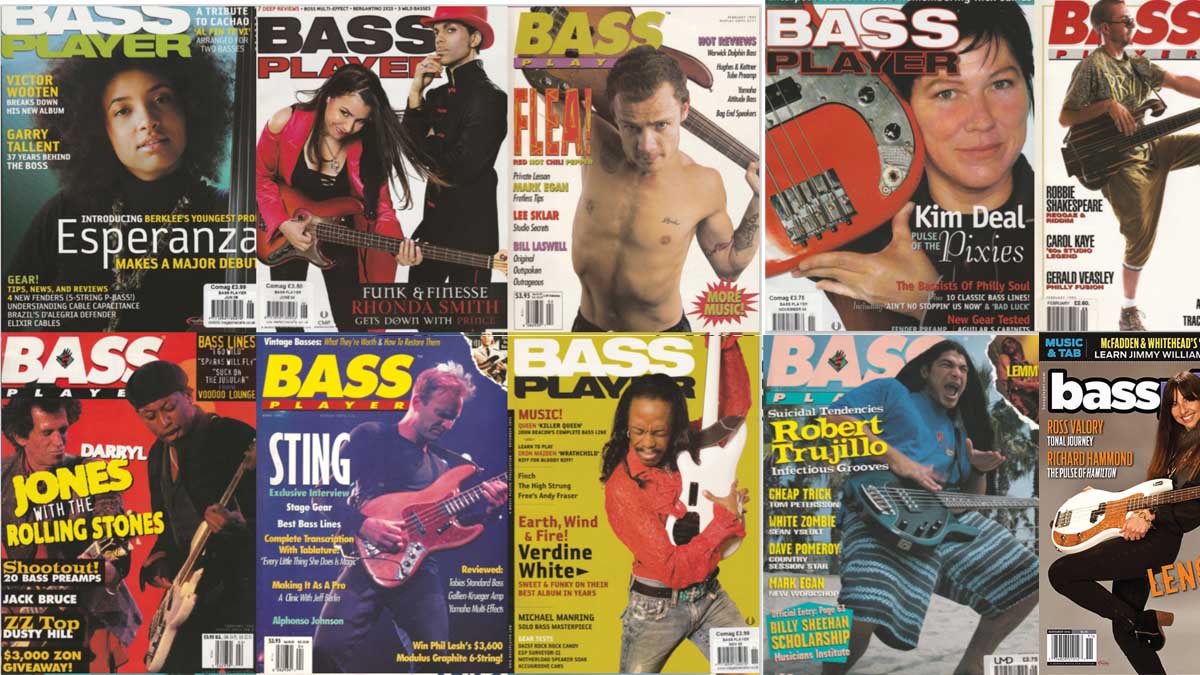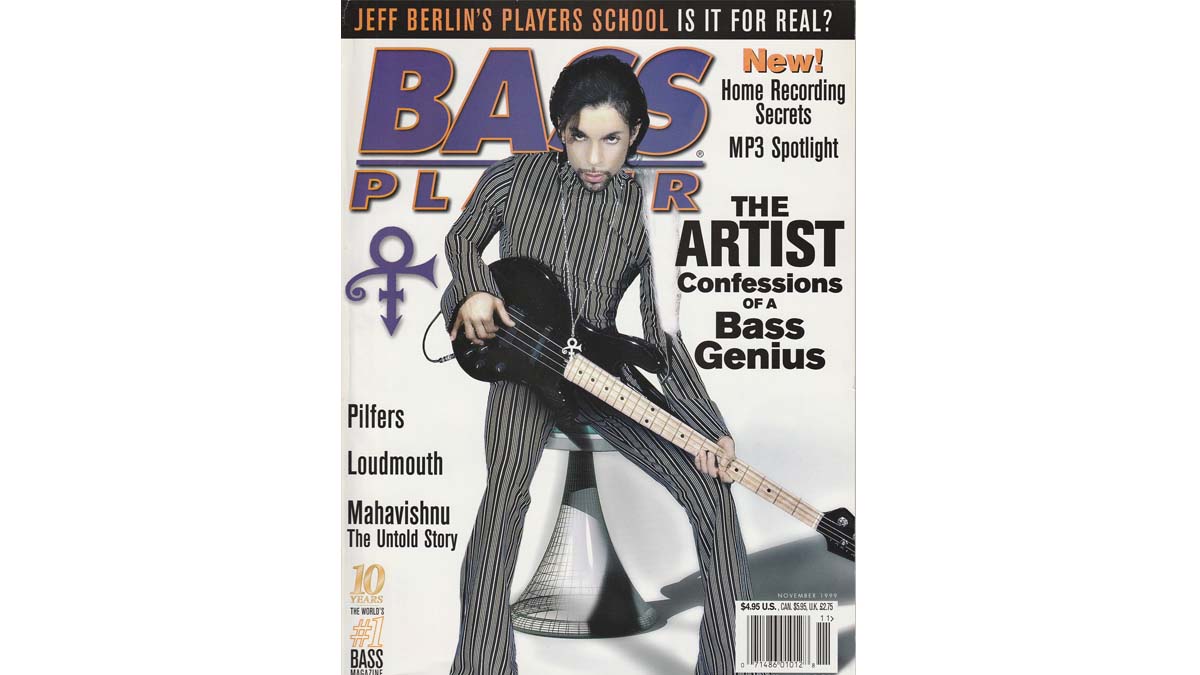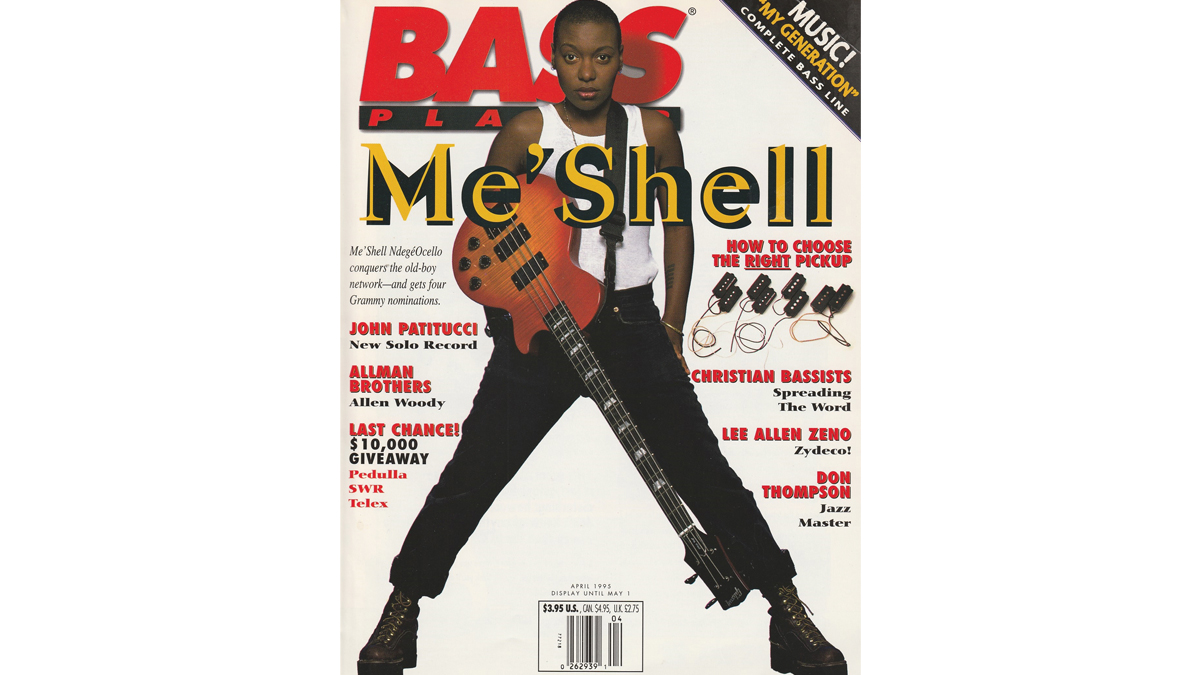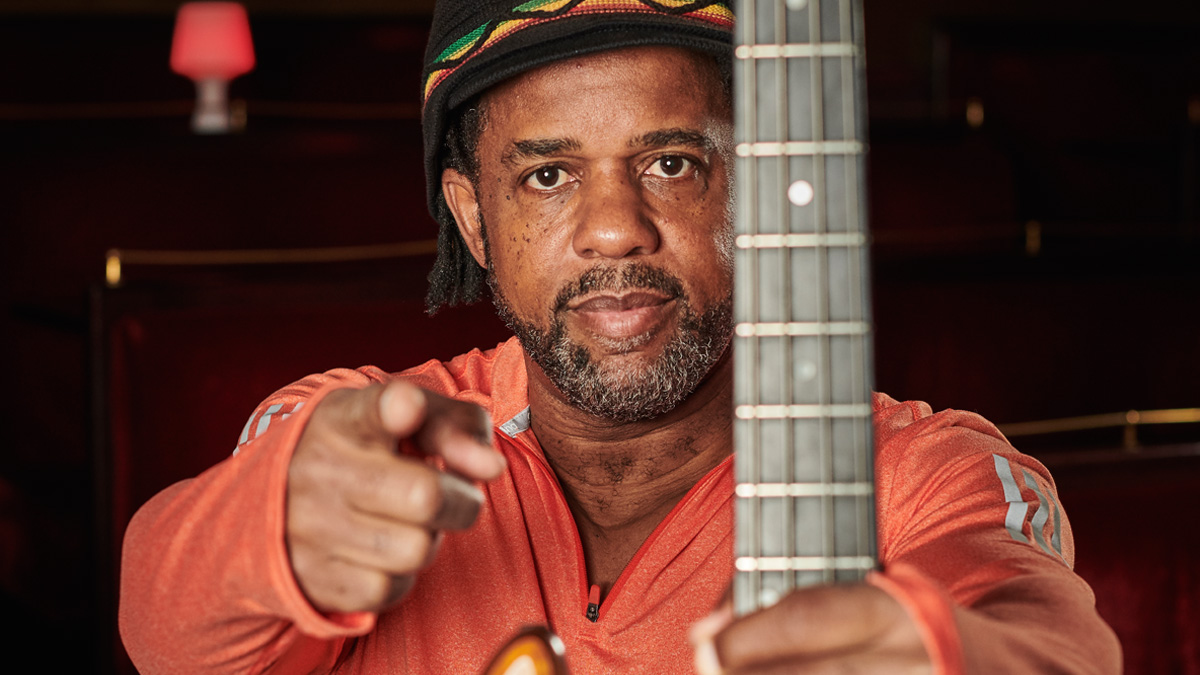45 bass legends share their top tips for bassists
We've leafed through 400 issues of Bass Player magazine to bring you wit and wisdom from our low-end heroes

We’re celebrating 400 issues of Bass Player, but that doesn’t mean we’re just congratulating ourselves on how great we are – we want you to benefit from the distilled wisdom we’ve learned along the way.
Apply these nuggets of knowledge from the world’s greatest bass players to your playing, and you’ll be well on the way to bass nirvana...
1. Prince (November 1999)

“Space is what it’s all about. I’m always telling people in rehearsal, you’ve got to shut up once in a while. Solo spotlights are fun and everything, but if you make music people want to hear, they’ll keep that tape.“
2. Geddy Lee, Rush (November/December 1988)
“The freedom of the trio is that you’re allowed to be as busy as the thing can take. Obviously you have to use taste and discretion where and when you’re being busy. You really have to serve the song the best way possible. If it serves the song to be busy, that’s fine, but if it best serves the song to be a bit more fundamental and groove-oriented, then you have to do that.“
3. Nathan East (May 1997)
“I quickly realized if I stayed on the same note when the chord changed, it made a difference – and if the chord stayed the same and I changed my note, that made a difference as well. That’s how I discovered the common tone and the substitution, and learned how I could control the complexion of the music.“
4. Stu Hamm (July/August 1991)
“The sound you get is in your fingers and the bass guitar. I try to use gear that gives me a true reproduction of that sound, without having to mess with a rack full of parametric EQs that are always going down.“
5. Jason Newsted, Metallica (September/October 1991)
“I’ve learned that there’s nothing easy about laying down a line with exact consistency – being right there in the pocket. I’m pretty much an orthodox player. I’m not against special techniques – if I took some time to figure out something, I’d be pretty proud of myself.“
Get The Pick Newsletter
All the latest guitar news, interviews, lessons, reviews, deals and more, direct to your inbox!
6. Tina Weymouth, Talking Heads/Tom Tom Club (November/December 1988)
“I don’t consciously look for particular licks to use. If anything, I try not to repeat myself. If I’ve done something before, I try to avoid using it again.“
7. Mark King, Level 42 (March 1992)
“It’s much more the player than the instrument. You have your own peculiar way of doing things, and they’re not always ‘correct’.“
8. Meshell Ndegeocello (April 1995)

“I am averse to real showy playing. I think allowing for the space is as artful as the notes... All the notes don’t necessarily equal better playing or better feeling... If you want to be a pop star, that’s a path to follow. If you want to be a follower of your musical muse, that’s a different path. Understand the difference.“
9. Paul McCartney (July/August 1995)
“I started to realize the power the bass player had within the band. Not vengeful power – it was just that you could actually control it, so even though the whole band is going along in A, you could stick in E.“
10. Will Lee (Fall, 1990)
“My basic approach can be summed up in two words: the pocket. The most important function of the instrument is creating and holding down the groove.“
11. Flea, Red Hot Chili Peppers (January/February 1992)
“I’m into the punk ethic: play every note like it’s your last! You could be dead tomorrow.“
12. Darryl Jones, The Rolling Stones (January/February 1995)
“I felt that it was important to play bass in my own style, so they [the Rolling Stones, in which Jones has played since 1993] would be hiring me for me. On certain songs, however, I play the lines note for note, because they’re essential parts.“
13. Stanley Clarke (March 2015)
“The true genius bassists are not the ones who play a million notes – it’s the ones whose bass-lines are loved worldwide and remembered through history.“
14. Michael League, Snarky Puppy (August 2014)
“One cool discovery I made some years back is getting an octaver sound without an effect pedal. I was plucking up over the fingerboard, and I realized that if you turn your tone all the way off and you pluck the note you’re fingering at exactly an octave up, you get this subtle, sub frequency an octave below the fingered pitch; I use that a lot.“
15. Rhonda Smith (June 2004)
“A device I use is the flamenco slap, which is like a drum rudiment; I ball up my fist and then let my fingers go out and hit the strings, starting with the pinky nail, subsequent fingers and the thumb.“
16. Billy Sheehan (Holiday 2013)

“My general approach to a new technique is to drill it all day long to get the hand strength and the patterns in my head robotically, and then throw all of that out the window and hope the result is some real, organic music down the line.“
17. Lee Sklar (July 2014)

“I’m not one of those guys who talks about the good old days. I just look at each day as the first day of my career, and I keep moving. I don’t care about what I’ve done in the past; the only thing I’m looking forward to is the next gig.“
18. Tony Levin
“Whichever licks I’ve been practising, and whichever basses sound great to me, I won’t try to impose that on the music in question. It’s all about the music, not about me.“
19. Nate Mendel, Foo Fighters (June 2015)
“I like to think of my ideal tone as a piece of lumber – I want it to sound solid and thick and dense. I keep it simple; no heavy effects, compression, or crossovers. If you find an amp that can handle a heavy attack without breaking up, which is fairly challenging, and if you add a little preamp to a bass that produces a solid tone, you’re pretty much there.“
20. Kim Deal, Pixies (November 2004)
“Guys think, if she can do it, I can do it. That’s a good thing, and if girls think the same way, it’s really good.“
21. Verdine White, Earth Wind and Fire (November 2005)
“Early on in the band, I just wanted to hear bass, bass, bass – the perils of youth! But as I began to admire and appreciate vocalists and songwriting, my playing became more focused and melodic. I progressed as a musician and a listener. Once I realized that the song was king, I didn’t worry as much about the bass notes.“
22. Jack Bruce, Cream (February 2015)
“I heard James Jamerson, and it turned my electric bass playing around; it turned everybody’s bass playing around. I started striving to play melodies on the instrument; to play lead bass, in other words. That’s what I do now, while maintaining the bass’s function as an anchor.“
23. Les Claypool, Primus (Holiday 2014)
“When you’re young, jumping around the stage and waving your dick around – ‘Here I am! Look at me go!’ Now we can sit back, play, and experience the music more.“
24. Cliff Williams, AC/DC (August 2015)
“Just listen to who you’re playing with – listen to the others. Too often, it seems younger players are just blasting away on their own. Be part of a unit and listen to other players and what’s going on around you. Persistence is a wonderful thing.“
25. Victor Wooten (November 2017)

“Who you are shows through your music, and that’s truer now than ever, because your music is more widely accessible. People aren’t putting up with the bad-attitude folks any more. Musicians are too easily replaced. We don’t live in the day when there was one Jimi, Jaco, or Charlie Parker.“
26. Steve Harris, Iron Maiden (December 2015)
“I never anchor my thumb anywhere. That’s why I wear my bass quite low – I’m playing at arm’s length. It feels comfortable. Some people play with their bass very high up, and that’s fine, but I suppose that would change the sound because you’re attacking with the fingers from the underneath more.“
27. John Taylor, Duran Duran (October 2015)
“My mentality is to keep my enemies close: we should understand technology and why it’s being used. If synth-bass is required, do it yourself, and you’ll never be obsolete. The bottom line is that people always need bass; we all might have to go from being bass players to being bass experts.“
28. Lemmy (Holiday 2015)
“I was a guitar player first, so I’m used to playing chords. It’s just like playing the guitar without the top two strings. I just made chords out of what strings I had left. It’s unorthodox, but it works for us.“
29. Gail Ann Dorsey (December 2015)
“Over time with an artist or a song, I begin to hear spaces suitable for my own personality. Naturally, I’ve always been a light touch and warm sound player. I start singing complementary bass ideas that reveal themselves, always remembering that my job is to support.“
30. John Patitucci (July 2015)
“It starts with thinking about your touch, and having a dynamic range on your instrument. That’s something younger players I encounter often lack. It’s hard to have a wide dynamic and expression range when your action is so low that your strings are resting on the frets. You don’t need a high action, but you have to be able to touch the strings in different ways and hear a difference.“
31. Billy Gould, Faith No More (July 2015)
“My bass sound is the tone I’ve always had. When I first started playing bass in this band, all I had was a cheap little amp and a terrible old bass, and it had this warped tone that I had to work with. Somehow, I found a way to make that tone strong, and it became part of my sound. I still have that approach toward my tone, and it all stems from having terrible gear.“
32. Bootsy Collins (January 2018)
“Hip-hop came from folks making something out of what they had, and what did they have? Records. We had instruments, they had records; different times, different era. But they made something out of nothing; that’s what funk is. Being funky is something that has to come up in you. There’s a certain amount of learning how to be funky, and that, to me, is not really funky.“
33. Ida Neilsen (January 2017)
“As a bassist, you tend to want to have ghost notes and staccato notes in between the main notes you play, because it sounds funky when you’re playing by yourself, and it helps you keep time. But when everyone is playing together, it actually sounds funkier when you’re not playing between the parts, which is extremely difficult to do.“
34. Paz Lenchantin (November 2016)
“There have been a lot of journeys, a lot of experiences, and a lot of playing with a lot of different people, who have taught me so much. Music offers me a great deal, and I’m constantly learning.“
35. Robert Trujillo, Metallica (January 2017)
“It’s important to play your instrument and be prepared, but there’s another side to all this. You have to get along with people and be able to balance personalities.“
36. Thundercat (June 2017)
“Sometimes I’ll hear the changes first, and I’ll ask myself what I’m supposed to find inside the harmony. Every once in a while I’ll be hearing a melody, and I’ll try to create the changes around it.
Practise listening, and following through on what you interpret as the required action
Esperanza Spalding, April 2016
“It comes from different places, and I try not to be scared or put limitations on myself. I’ll try anything, even if I hear something I don’t like. I’ll go for it. There’s no wrong way.“
37. Doug Wimbish (October 2017)
“My tone came from trial and error, making records, doing gigs, playing different styles, and becoming different characters. The shape of your note is based on the spacing, the songs you play, how you articulate things, and how you push it. Every time I see someone play, school is in. The more I play, the more comfortable I am switching characters.“
38. Jamareo Artis (September 2016)
“As musicians, we have the ability to affect people’s emotions through our playing. The average listener doesn’t understand the technical side of what we’re doing; they just know that the music we’re playing makes them feel a certain way.“
39. Tim Commerford (January 2018)
“Experimenting with amplifiers and basses is a part of me. My tone is always a work in progress, and the stage is my laboratory.“
40. Oteil Burbridge (February 2018)
“There are only 12 notes, but why do certain voicings make you feel something strong emotionally? Take one note out of a chord or move a note, and it does something to your DNA.“
41. Krist Novoselic (June 2018)
“Those Nirvana bass-lines I wrote were really easy, but they were catchy, so many players got their start learning them and following along with them. Now they’re on YouTube and kids are still learning from them. That’s how I learned too, just playing along with music in my room. The bass is not just a bastard stepchild of the guitar. As a bass player, you have to know that.“
42. Glenn Hughes (January 2018)
“I like jazz chords in rock, and I use chords that are usually a no-no for most rock guys – a lot of triads and major sevenths. A minor nine is a very sad yet sexy chord.“
43. Francis 'Rocco' Prestia (August 2018)
“The key for me is to take a fresh approach to each bass-line every night. I challenge myself to stay in the moment and get the part right, section by section, as opposed to going on automatic pilot and having my mind wander.“
44. Derek Smalls (May 2018)
“I’ve done high parts where I’m singing a bit high. But that’s where my ear goes, and where my ear goes, my fingers and voice follow. My ear always goes down, and I’ve never said, ‘Here, come, let’s go the other way, ear.’“
45. Marcus Miller (September 2018)
“People treat jazz like it’s a secret society, and no-one is going to take the time to explain it to you. I’ll do that for you.“
“I asked him to get me four bass strings because I only had a $29 guitar from Sears”: Bootsy Collins is one of the all-time bass greats, but he started out on guitar. Here’s the sole reason why he switched
“I got that bass for $50 off this coke dealer. I don’t know what Jaco did to it, but he totally messed up the insides!” How Cro-Mags’ Harley Flanagan went from buying a Jaco Pastorius bass on the street to fronting one of hardcore’s most influential bands










